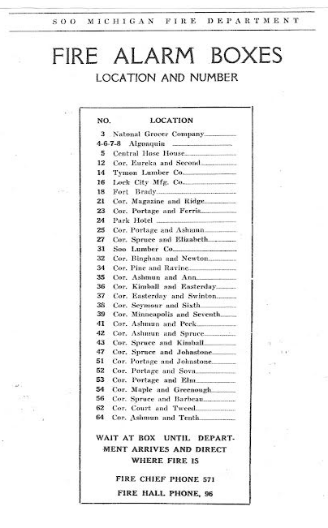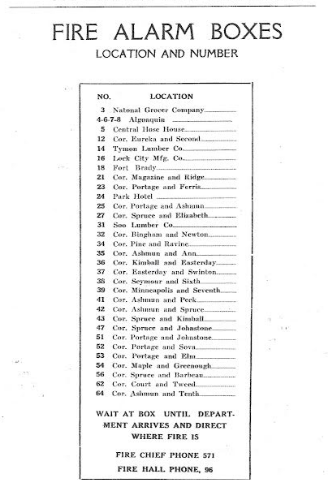In the early twentieth century, some of my ancestors were firefighters in the Sault. Going through some old papers, I have found bits and pieces of firefighting history from our area. As with anything over 100 years old, things aren’t always in the best shape. Books, papers, and photos tear and fade over time. I have tried to keep the integrity of the work, and I hope I have done the recopying of this work justice. The font in my papers is tiny; this hasn’t been an easy task for someone with eye issues. I have decided to share this information in articles over the next few weeks. The articles I will present are not my words, and unfortunately, I cannot attest to who wrote the pieces. The pieces of work that I have do not reveal the author, but it is assumed it was the Sault Firefighters as a collective. The Eastern Upper Peninsula is rich in history. I hope that by sharing this information about the Sault, you will come away with a deeper and greater respect for our past and present firefighters. – Laurie Davis
Early Firefighting In The Sault
To the old-time Sooite – the pioneer workman, business or professional man or woman, or the boy or girl of the early days here – it seems quite a great stride from the old Red Rover and Vigilant fire companies to the modern fire fighting apparatus that is ours today. And yet, in retrospect, it seems but yesterday since those gallant fire laddies of the old bucket brigades fought so valiantly against the fire stocks and great lumber piles from time to time. When we think of fire fighting the work of these old companies comes vividly before us. Then comes another picture – the introduction of the motor-driven apparatus and the gradual almost complete automobile force of today.

The horse-drawn hose wagons are undoubtedly the classics of firefighting. In the palmy days of this method, every one had his favorite fire team and favorite driver. Any reader of this little sketch will recall that he would back the grays of that company. Each had his passion for fire horses. The firemen and the fire horses loved the game, and its fascination grew with the years of service.
It all comes back to us as we ponder, and when we figure the time is the span of a generation, or at best a little more. The progress of the Soo Fire Department is in keeping with the progress of fire fighting over the world. It may seem odd to you, but a study will show that the Soo has always been up to date in the matter here dealt with. Crude as those old-time methods may seem, they were as good as the best. Bigger cities had more of it, but they had no better. For be it known that it is only within recent years that fire protection and fire fighting has been gotten down to the science as we know it today.
Firefighting companies however are no new or recent creation. It may be that the cavemen, of prehistoric times, had means of fighting flames, if they were harassed by them. We have no record that there was any concerted effort against the rain of fire and brimstone, futile as it would have been when Sodom and Gomorrah were obliterated. But there may have been fires and firefighters in those or earlier days. The first mention of fighting fire with water in the history of the world is a reference to Hero, of Alexandria, in the year 150 B.C. There is also a reference by Pliny to fire engines in Rome in the golden age of the empire.
The closest approach to modern methods is found in a reference to firefighting in London, England in the Sixteenth century, when “squirts” were used. These “squirts” were a sort of syringe three or four feet long by two and a half or three inches in diameter and were worked by hand. Then the London Fire Department improved its facilities by having cisterns on wheels. These were equipped with pumps and are said to have done good service. In 1672 Jan van der Hyde and his son invented a hose, made of leather, but it was not until 1828, that John Brathwaite devised the first steam fire engine. This was a cumbersome affair that was worked on fire wells dug at convenient parts of the various cities where used. Fire wells, of course, had been in vogue for many years. This source of water supply dating from 1676, was developed by a New York enterprise. The fire department was started – it would hardly be called organized – in 1659.
It has taken a heavy blow to most of our great cities to cause the organization of strong fire departments. This is a notable fact in the history of Philadelphia, which had a disastrous conflagration in 1851; Chicago, in 1871, and Boston in 1872.
Fire Alarm Telegraph
When fire departments were first started as substantial municipal organizations about the middle of the last century, the telegraph immediately entered into its development. Previous to 1851, the primitive method of shouting fire alarms and ringing bells – still used in some of the smaller communities – was the only means of calling firemen. In 1845, New York City was divided into districts, each district having a watch tower in which a man was constantly on guard. When a fire broke out he tapped a bell the number of times that indicated his district. The man in the next district picked it up and it was again relayed until all watch towers of the city had it. It was in this year that Dr. W.F. Channing, in an article in the Boston Advertiser, suggested a method for the application of Professor Morse’s invention of the telegraph for alarms of fire. In 1851, he succeeded in interesting the city council of Boston to such an extent that $10,000 was appropriated for an experiment. With the aid of Moses G. Farmer, the electrical expert of that day, Dr.Channing worked out practically the machinery necessary to complete the inventions made by these two men.
Mr. Farmer constructed the Boston system and continued in charge of it for many years. Messrs. Channing and Farmer took out many patents, which were the foundation of the system, as it exists today. In 1855, John N. Gamewell heard a lecture by Dr. Channing, and soon afterward purchased the right to the inventions mentioned for the southern states. In 1859, he purchased the patent rights for the rest of the country. The early promoters of the system met with many discouragements but finally won out.
- The Mystery Man - March 10, 2025
- Reverend Thomas R Easterday - February 3, 2025
- Teaching Future Leaders - January 27, 2025



